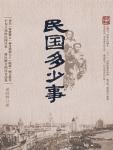Chapter 1 The wind and smoke are full of clouds
King Helianbo (Mei Yi)
Like a gust of hot wind, like a layer of dream shadow, an era that brought so much hope and trauma to China has disappeared in the long river of history in just thirty-eight years, leaving behind an annoying and tempting chaos for future generations to pass on. Organize, describe and interpret.
This era is the Republic of China from 1912 to 1949.
Since July this year, I have read a series of historical essays by Xie Yiqun one after another.Like so many applauding readers on the Internet, I was immediately attracted by this extraordinary masterpiece.The artistic conception of the work is broad, the selection of materials is unique, the historical materials are informative, and there are new ideas from time to time; the text is more like flowing water, and the unique description of the turbulent times and historical details strongly impacts the readers' hearts. Let go and let go.
The Republic of China is a short but extremely unique era in Chinese history.Like the Spring and Autumn and Warring States period, chaos and turmoil are its background. At that time, the country was torn apart, the world was full of wars, and the current situation was changing rapidly.Because the old rules were broken and a new order was not established, the gentle and majestic long river of history set off turbulent waves here, and the natures of all kinds of people either gained a wide space for release, or were cruelly distorted by the times.Thus, heroes and heroes, warriors and scribes, temples and marketplaces, squares and secret rooms, gunpowder smoke on the battlefield and green shade on the campus, family and country sentiments and wretched battles... staged performances one after another that may be soul-stirring or infuriating. Nostalgia, or vivid stories that make people sigh.
At the same time, the Republic of China was an era in which the old and the new were intertwined, and traditional consciousness and modern trends confronted and merged. Visible struggles took place on the battlefield, officialdom and shopping malls, and invisible collisions were scattered in every corner of society at any time.In the period when China was undergoing a drastic transition from ancient times and modern times to modern times, the mottled and grotesque appearance added more charm to this troubled world.
In Xie Yiqun's novel, we saw Xu Xilin, who was tortured and never regretted his death. The true face of this character who appeared in the novel was finally unfolded in front of us in detail; The "faces" of historical figures are gradually peeling off; we have seen Yuan Shikai, who straddles the old and the new, and has exhausted all the organs. The storm of history blows away; we see the talented young politician Song Jiaoren, whose life is a rare pursuit of Chinese politics, but this new green that brought China into modern political civilization was eventually drowned in blood.We also saw the reckless warlords in different poses and with different expressions, saw the huge treasures of the Eastern Qing Tombs exposed to the wind and rain of the Republic of China, saw the cultural giant Lu Xun suffering from the pain of arranged marriages and brotherly rivalry, and saw Southwest Associated University in the midst of war A tenacious line of scholarly and holy ideals, and saw the cruel and legendary underworld on the beach...
With a short time distance, in the smog and rain of the years, today we look back at the scenes that once happened in the first half of the 20th century and will never again, adding a sense of historical nostalgia.
The well-known historical events and scenes are recreated with ingenious writing, which has a shocking power; the lesser-known anecdotes of the Republic of China are easily read, which is eye-opening.The accumulation of extensive knowledge and miscellaneous hunting over the years has given this book a considerable amount of information, which greatly satisfies readers' curiosity and thirst for knowledge about this vague history.Moreover, the outlines of the works are all prepared, which not only grasps and spreads the magnificent historical picture, but also delicately explores the specific historical facts and the subtle aspects of social life.Opening this book, we seem to hear a moving piece of music that is sometimes vigorous and sometimes sad and lingering.
Historical prose is first of all a literary work, "history" is the subject matter, and "prose" is the style.I really appreciate a concept put forward by Xie Yiqun. He said: "Narrative historical prose can be regarded as 'reportage writing about the past'." Since writing historical past events requires accurate and reliable historical materials that can give people historical knowledge; Literature requires sophisticated techniques, brilliant writing, and aesthetic enjoyment.It is precisely this kind of self-awareness that makes history as an object of aesthetic appreciation while exploring and recognizing history. With the help of its profound writing skills, it strives to achieve the integration of literature and history, so the writing is both intellectual and emotional, cold and strong. And present, overflowing beauty everywhere.
I have no intention of overestimating this work.The historical materials based on the book are rich and complex. In the eyes of real historians, there must be more than one or two mistakes and omissions; although trying to introduce the latest historical research results in recent years, some chapters are still a bit too compliant with the traditional view of history; Moreover, due to the scope of interests and other reasons, many important contents in the history of the Republic of China have not been written.These are all to be worked on in the next step.
So far, the writing will not take up any more time for readers, and I invite you to enter the wonderful text below.
October 2007 in Shenzhen

